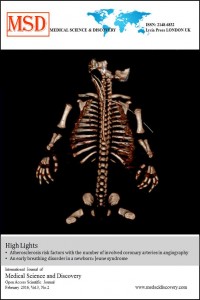Abstract
Objective: We aimed to share the features of 45 patients with firearm injuries related head traumas and our experiences in their treatments. Methods: Our cases consisted of 36 males 45 patients in total between the ages of 18-65, who were brought to the emergency service of our hospital due to firearm injuries. For this retrospective study, it was accessed to the patient data from the archival records of our hospital. The demographical data of the patients like age and gender, and the records such as type of injury, injured area in head, diagnosis, treatment and follow ups were reviewed. Results: There were sinus injury related epidural haemorrhages in 8 of patients who underwent urgent surgical intervention (17.8%). In 18 of the patients (39.95%) who underwent surgery had supratentorial injuries and 7 (15.55%) had infratentorial injuries. All these 25 patients (55.50%) who underwent surgery had multiple intracranial injuries (compression fracture + subdural haemorrhage + contusion + pneumocephalus + SAH + brain edema). Four of these 6 patients with multiple injuries had abdominal injuries. Two patients had haemopneumothorax. There were vertebra and extremity injuries in 2 patients with abdominal injuries. Conclusions: Brain injuries occurring with the firearm head injuries are seen as multiple injuries and their rate of mortality is quite higher. |
References
- Alewander RH, Proctor HJ Head Trauma in: Advanced Trauma Life Support. 3 Edition. American College of Surgeons. Chicago, 1993; pp 159-83.
- Benzel EC, Day WT, Kesterson L, Willis BK, Kessler CW, Modling D, et al. CIVILIAN CRANIOCEREBRAL GUNSHOT WOUNDS. Neurosurgery. 1991;29(1):67-72.
- Erdogan E, Gonul E, Seber N. Craniocerebral gunshot wounds. Neurosurgery Quarterly. 2002;12(1):1-18.
- Gonul E, Baysefer A, Kahraman S, Ciklatekerlioglu O, Gezen F, Yayla O, et al. Causes of infections and management results in penetrating craniocerebral injuries. Neurosurgical Review. 1997;20(3):177-81.
- Grahm TW, Williams FC, Harrington T, Spetzler RF. CIVILIAN GUNSHOT WOUNDS TO THE HEAD - A PROSPECTIVE-STUDY. Neurosurgery. 1990;27(5):696-700.
- Jinkins JR, Dadsetan MR, Sener RN, Desai S, Williams RG. VALUE OF ACUTE-PHASE ANGIOGRAPHY IN THE DETECTION OF VASCULAR INJURIES CAUSED BY GUNSHOT WOUNDS TO THE HEAD - ANALYSIS OF 12 CASES. American Journal of Roentgenology. 1992;159(2):365-8.
- Kapp JP, Gielchinsky I. Management of combat wounds of the dural venous sinuses. Surgery. 1972;71:913.
- Kaufman HH, Makela ME, Lee KF, Haid RW, Gildenberg PL. GUNSHOT WOUNDS TO THE HEAD - A PERSPECTIVE. Neurosurgery. 1986;18(6):689-95.
- Liebenberg WA, Demetriades AK, Hankins M, Hardwidge C, Hartzenberg BH. Penetrating civilian craniocerebral gunshot wounds: A protocol of delayed surgery. Neurosurgery. 2005;57(2):293-8.
- Matson DD, Wokin J. Hematomas associated with penetrating wounds of the brain. Journol of Neurosurg, 1981; (54):44-8.
- Meirowsky AM. Penetrating Craniocerebral Trauma. Springfield, III Thomas, 1984.
- Meirowsky AM. SECONDARY REMOVAL OF RETAINED BONE FRAGMENTS IN MISSILE WOUNDS OF THE BRAIN. Journal of Neurosurgery. 1982;57(5):617-21.
- Rish BL, Caveness WF, Dillon JD, Kistler JP, Mohr JP, Weiss GH. ANALYSIS OF BRAIN-ABSCESS AFTER PENETRATING CRANIOCEREBRAL INJURIES IN VIETNAM. Neurosurgery. 1981;9(5):535-41.
- Stone JL, Lichtor T, Fitzgerald LF. GUNSHOT WOUNDS TO THE HEAD IN CIVILIAN PRACTICE. Neurosurgery. 1995;37(6):1104-10.
- Ziya İM, Kılınçoğlu BF, Şahin Y, Aydın Y. Penetrating cranicerebral gunshot wounds. Ulusal Travma Acil Cerrahi Dergisi, 1999;(5):238-41.
Abstract
References
- Alewander RH, Proctor HJ Head Trauma in: Advanced Trauma Life Support. 3 Edition. American College of Surgeons. Chicago, 1993; pp 159-83.
- Benzel EC, Day WT, Kesterson L, Willis BK, Kessler CW, Modling D, et al. CIVILIAN CRANIOCEREBRAL GUNSHOT WOUNDS. Neurosurgery. 1991;29(1):67-72.
- Erdogan E, Gonul E, Seber N. Craniocerebral gunshot wounds. Neurosurgery Quarterly. 2002;12(1):1-18.
- Gonul E, Baysefer A, Kahraman S, Ciklatekerlioglu O, Gezen F, Yayla O, et al. Causes of infections and management results in penetrating craniocerebral injuries. Neurosurgical Review. 1997;20(3):177-81.
- Grahm TW, Williams FC, Harrington T, Spetzler RF. CIVILIAN GUNSHOT WOUNDS TO THE HEAD - A PROSPECTIVE-STUDY. Neurosurgery. 1990;27(5):696-700.
- Jinkins JR, Dadsetan MR, Sener RN, Desai S, Williams RG. VALUE OF ACUTE-PHASE ANGIOGRAPHY IN THE DETECTION OF VASCULAR INJURIES CAUSED BY GUNSHOT WOUNDS TO THE HEAD - ANALYSIS OF 12 CASES. American Journal of Roentgenology. 1992;159(2):365-8.
- Kapp JP, Gielchinsky I. Management of combat wounds of the dural venous sinuses. Surgery. 1972;71:913.
- Kaufman HH, Makela ME, Lee KF, Haid RW, Gildenberg PL. GUNSHOT WOUNDS TO THE HEAD - A PERSPECTIVE. Neurosurgery. 1986;18(6):689-95.
- Liebenberg WA, Demetriades AK, Hankins M, Hardwidge C, Hartzenberg BH. Penetrating civilian craniocerebral gunshot wounds: A protocol of delayed surgery. Neurosurgery. 2005;57(2):293-8.
- Matson DD, Wokin J. Hematomas associated with penetrating wounds of the brain. Journol of Neurosurg, 1981; (54):44-8.
- Meirowsky AM. Penetrating Craniocerebral Trauma. Springfield, III Thomas, 1984.
- Meirowsky AM. SECONDARY REMOVAL OF RETAINED BONE FRAGMENTS IN MISSILE WOUNDS OF THE BRAIN. Journal of Neurosurgery. 1982;57(5):617-21.
- Rish BL, Caveness WF, Dillon JD, Kistler JP, Mohr JP, Weiss GH. ANALYSIS OF BRAIN-ABSCESS AFTER PENETRATING CRANIOCEREBRAL INJURIES IN VIETNAM. Neurosurgery. 1981;9(5):535-41.
- Stone JL, Lichtor T, Fitzgerald LF. GUNSHOT WOUNDS TO THE HEAD IN CIVILIAN PRACTICE. Neurosurgery. 1995;37(6):1104-10.
- Ziya İM, Kılınçoğlu BF, Şahin Y, Aydın Y. Penetrating cranicerebral gunshot wounds. Ulusal Travma Acil Cerrahi Dergisi, 1999;(5):238-41.
Details
| Primary Language | English |
|---|---|
| Journal Section | Research Article |
| Authors | |
| Publication Date | January 13, 2016 |
| Published in Issue | Year 2016 Volume: 3 Issue: 2 |


